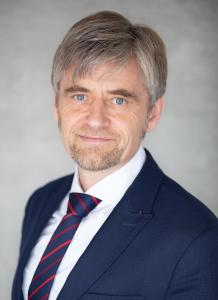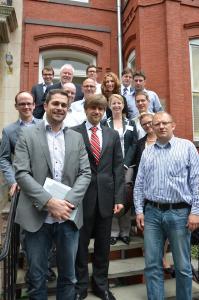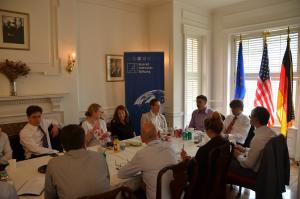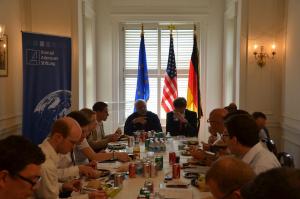An Alliance Evolved - Foundation Office Washington, D.C.
Seminar
Details
In the last few years, the Obama Administration has been perceived as looking for partnerships outside of Europe. Moreover, observers have noted that there are possible signs of isolationist tendencies, heavily influenced by economic factors. To maintain robust transatlantic relations, the Konrad Adenauer Stiftung in cooperation with the American Jewish Committee engaged young German political and civic leaders and held a seminar on the current issues effecting social, cultural, political and economic life in the United States and Germany. Participants in the discussion included Dr. Jackson Janes, Executive Director of the American Institute for Contemporary German Studies, and Matt Lewis, Senior Correspondent for the Daily Caller.
Dr. Janes opened the discussion with a brief description of the historical relationship between the United States and Germany within a political-historical context. The discussion touched upon the importance of the German-American bond and the rationale behind it. Before 1989, Germany was seen as an object of concern to American foreign policy, while today, it is viewed as a subject of American foreign policy.
The fact is that today, Germany and Europe as a whole, are part of a much larger matrix through which the U.S. pursues its foreign policy objectives, and the immediate concerns (far and near) drive U.S. and
German relations. The U.S. and Germany are far more integrated within the global framework, and a
crisis on one side of the globe may imperil a country on the other side.
Concerns were raised, however, particularly with regards to the role that Germany and the E.U. will
play in resolving current issues such as climate change, immigration, failed states, and economic
development. The concern is that the transatlantic community may not be up to task to deal with these
problems on their own. Member states are more and more questioning their own separate roles in
NATO and their involvement in Libya, as well as their economic development potential (or lack there off) within
the Euro Zone. A major concern that is now being voiced in the U.S. is that while the E.U. may still be united economically, it speaks with a multitude of voices when it comes to foreign policy decisions. This lack of cohesion
on foreign policy, taken together with the fact that economic conditions may force the U.S. to scale
down its military operations, leave Germany and Europe in a precarious position of needing to take on a
far greater role in shaping the global narrative when it comes to political issues with multiple national
interests.
Mr. Lewis reflected on the current U.S. position on the global stage and acknowledged that the U.S is
now responding conditionally to global issues based on current budget constraints. For the U.S., the
economy and the debt are the two biggest issues heading into the 2012 Presidential and Congressional
elections. The discussion revolved around the fact the no U.S. president has ever been reelected
while presiding over an economy that has more than 7 percent unemployment (except for Ronald
Reagan). Historically, the cards are stacked against President Obama. Barring a foreign policy fiasco, the
economy, the unemployment situation and the national debt will still be at the forefront come 2012.
Mr. Lewis also summarized the potential impact of potential Republican contenders and would-
be contenders that hope to win the Republican presidential primary and challenge President
Obama. Particularly, Mr. Lewis described the current field and the projected leaders, such as former
Massachusetts Governor Mitt Romney and Congresswoman Michelle Bachmann, to the possible
contenders, such as Sarah Palin and current Texas Governor Rick Perry. Mr. Lewis also discussed the
differences in conservative candidates when it comes to tradition versus fundamentality. The traditional
conservatives rely to this day on the evolution of political ideas through the progression of U.S. law
and judicial precedents. Fundamentalists seek to interpret the original intent of the U.S. constitution,
choosing not to rely on judicial traditions or the progression of U.S. law. The fight between the
traditionalists and the fundamentalists (with which the Tea Party could be grouped) is now being waged
within the Republican establishment. The current wisdom is that the winning ideology will choose the
candidate that will challenge President Obama.
From the discussions, it became apparent that The Konrad Adenauer Stiftung must continue to provide
a platform for transatlantic dialogue for developing and implementing a consistent approach toward
dealing with the political and economic issues that threaten and imperil the U.S., Germany and the E.U.
The Konrad Adenauer Foundation plans to organize many more such events in the future that support
and promote the transatlantic dialogue initiative.






